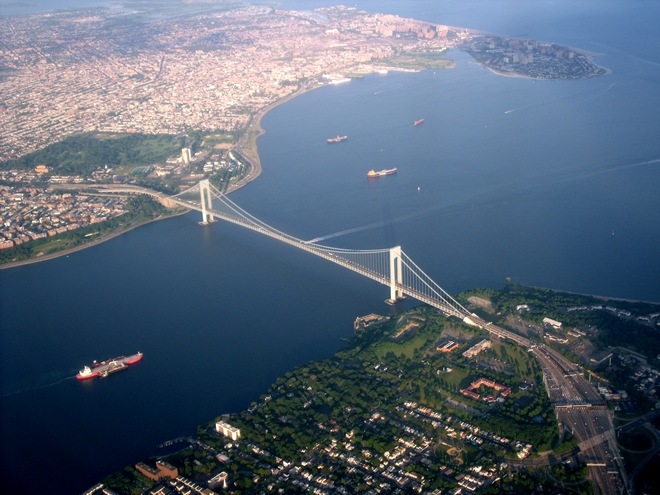
The Verrazano-Narrows Bridge Photo: Wikimapia.org
Here is a symbol of China's assault on the US economy: the Verrazano-Narrows Bridge, which connects Brooklyn and Staten Island. This landmark, which opened in 1964, is North America's longest suspension bridge. It's also in urgent need of renovation. Unfortunately, $34 million in steel production and fabrication work has been outsourced to China.
How did this happen? The Metropolitan Transportation Authority says a Chinese fabricator was picked because the two American companies approached for the project lacked the manufacturing space, special equipment and financial capacity to do the job. But the United Steelworkers claims it quickly found two other American bridge fabricators, within 100 miles of New York City, that could do the job.
The real problem with this deal is that it doesn't take into account all of the additional costs that buying "Made in China" brings to the American table. In fact, this failure to consider all costs is the same problem we as consumers face every time we choose a Chinese-made product on price alone - a price that is invariably cheaper.
Consider the safety issue: a scary one, indeed, because China has a very well-deserved reputation for producing inferior and often dangerous products. Such products are as diverse as lead-filled toys, sulfurous drywall, pet food spiked with melamine and heparin tainted with oversulfated chondroitin sulfate.
In the specific case of bridges, six have collapsed across China since July 2011. The official Xinhua news agency has acknowledged that shoddy construction and inferior building materials were contributing factors. There is also a cautionary tale much closer to home.
When California bought Chinese steel to renovate and expand the San Francisco-Oakland Bay Bridge, for a project that began in 2002, problems like faulty welds by a Chinese steel fabricator delayed the project for months and led to huge cost overruns. Those delays eroded much of the savings California was banking on when it opted for the "cheap" Chinese steel.
There is a second reason not to buy "Made in China" products: jobs. The abiding fact is that steel production is heavily subsidized by the Chinese government. These subsidies range from the massive benefits of a manipulated and undervalued currency to the underwriting of the costs of energy, land, loans and water.
Because of China's subsidies - most of which are arguably illegal under international trade agreements - its producers are able to dump steel products into the US at or below the actual cost of production. This problem is particularly acute now as China is saddled with massive overcapacity in its steel industry.
Of course, every job China gains by dumping steel into US markets is an American job lost. Each steelworker's job in the United States generates additional jobs in the economy, along with increased tax revenues. With more than 20 million Americans now unable to find decent work, we could certainly use those jobs as we repair the Verrazano Bridge.
The MTA has ignored not only the social costs but also the broader impact on the environment and human rights. Chinese steel plants emit significantly more pollution and greenhouse gases per ton of steel produced than plants in the United States. This not only contributes to global warming but also has a direct negative impact on American soil, since an increasing amount of China's pollution is crossing the Pacific Ocean on the jet stream.
Finally, when US companies and government agencies opt for Chinese over American steel, they are tacitly supporting an authoritarian regime that prohibits independent labor unions from organizing - one of many grim ironies in today's People's Republic. As a result, US workers are forced to compete against Chinese workers who regularly work 12-hour days, six or seven days a week, without adequate safety gear. Both Chinese and US steelworkers wind up as victims.
The bottom line here is this: Buying "Made in China" - whether steel for our bridges or dolls for our children - entails large costs that most consumers and, sadly, even our leaders don't consider when making purchases. This is hurting our country - and killing our economy.
|
|
||
 |
| Touched | Sympathetic | Bored | Angry | Amused | Sad | Happy | No comment |
Rhythm Media Group is a multi-media company, operating a US-based Chinese daily newspaper, The China Press, and the paper's website - uschinapress.com (which has mobile-app version), as well as a Beijing-based English website Sino-US.com. The group boasts 15 branch offices across the US, and a number of cultural centers focusing on culture-related business in the North America, Chinese mainland, Hong Kong and Taiwan.Launched in September 2012, the Sino-US.com is designed to serve as a bridge between China and the US, and to keep its readership inside or outside China better informed by providing news and insights on China's current affairs, culture, life, business, people and sports.
|
|